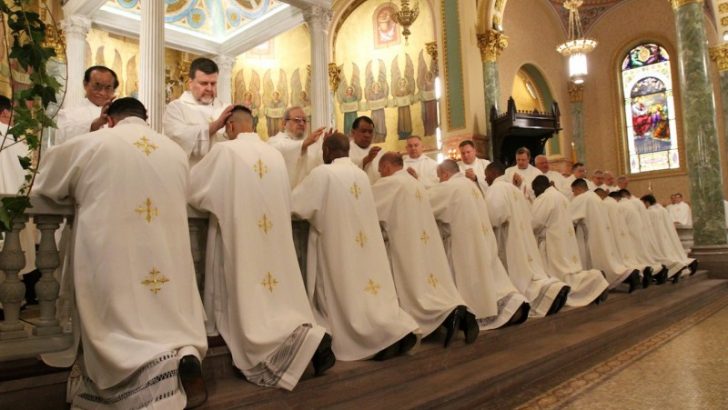“perhaps the fact that ordinations are now rarer make them more valued”, contemplates Mary Kenny
Two new priests recently ordained in Galway were photographed all smiles after their ordination ceremony on the Feast of the Epiphany. Fr John O’Halloran is 38 and Fr Michael King is 39 and their stories attracted interest because they had had previous careers before joining the priesthood.
Fr John had been a greenkeeper at Oughterard Golf Course – a beautiful part of Connacht where the fishing has always been so renowned – and Fr Michael had been a barman in a Galway city nightclub.
I think it’s a terrific thing when a man comes to the priesthood having had a different job, or done something else previously. It indicates maturity and reflection, and the 30s are a very good time to make a life-change: you’ve lived long enough to get sense, but you’re still young enough to be full of enterprise and energy.
Working with nature among the golf greens and serving customers in a night club also puts you in touch with real life. Such experiences give a person a “hinterland”, as the late Denis Healey, the British parliamentarian, put it (regretting the fact that too many young people go into politics now who have known nothing but politics).
There are sometimes pessimistic reports about the shortage of priests in Ireland today – just 14 priests were ordained in Ireland in 2015 – and many older priests are feeling the strain of that shortage.
And yet, perhaps the fact that ordinations are now rarer make them more valued?
Whatever is in short supply is usually more highly appreciated.
The well-attended double ordination was described as “a big boost” for the Galway diocese, and so it is. It’s also, perhaps, an indication of an interesting trend: later vocations, and valued candidates.
A wedding does not need to cost money
Marriage, like governance, should be a voluntary affair: indeed, I understand that the nuptial laws of the Catholic Church stipulate that it be entered into freely – being forced or coerced into marriage is usually grounds for annulment.
But I wish people didn’t so often think that a wedding has to be a big, expensive affair. Many a couple remain unmarried because of this apparent assumption.
The successful actress Michelle Doherty (she was in a terrific Irish film called What Richard Did – based on the story of a Blackrock boy who was killed in an affray) recounts that she was discussing marriage with her boyfriend, Mark O’Shea but when he proposed she said, “I’d prefer to have a baby”. She explained that she “couldn’t justify” the expense that was entailed in having a wedding ceremony. So they had the baby, which is of course lovely.
Costs
No one is forcing her to get married against her will but why make an excuse about how much a wedding costs? You can get hitched for the cost of a wedding licence (€20 in Ireland, £35 in England, where the couple presently live), a small gratuity to the priest, if in church, and a modest lunch in a local pub afterwards.
If the Church supports marriage, ecclesiastics should make this point in public from time to time. A wedding does not need to cost money.
Monarchies must be visible and popular
The continental monarchies of Europe remain popular with the people – especially the Scandis and the Dutch – with this proviso: the royals in question must be seen to be visible, and the members of these families must behave themselves.
King Philippe of Belgium was recently criticised for not being visible and present when Brussels was in the grip of a terrorist alert. He was at a health spa at the time. Amber signal for the Belgian monarchy, whose duty is to hold together this troubled nation.
And now the Infanta Cristina of Spain, sixth in line to the throne, is facing criminal proceedings arising from an investigation into her husband’s financial affairs: the Basque businessman Inaki Urdangarin, given a dukedom on his marriage to Cristina, faces serious charges of embezzlement.
The Spanish monarchy is more vulnerable than those in Northern Europe – and less embedded in the culture – and this episode could weaken its position.
Spain must have whatever form of governance the people choose, so if the monarchy falls, it will be because it has failed the approval test that modern monarchies must meet.
However, there would be many lamentations among the Continental magazines for whom the exquisitely pretty Queen Letizia is currently a particular favourite. The French magazine Point de Vue devotes many pages to Letizia, often photographed with her best friend, Queen Rania of Jordan.
I suggested that monarchies must be visible and popular. Perhaps another requirement in the paparazzi age is beauty. The three younger queens in Europe – Maxima in the Netherlands, Mathilde in Belgium and Letizia in Spain – are a distinct visual improvement on the lantern-jawed Hapsburgs of old.


 Mary Kenny
Mary Kenny